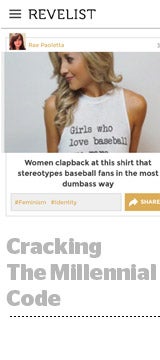 While still in its infancy, CafeMedia’s three-month-old platform for millennial women, Revelist, is already exploring opportunities for further monetization.
While still in its infancy, CafeMedia’s three-month-old platform for millennial women, Revelist, is already exploring opportunities for further monetization.
Now at 1 million monthly unique visitors and 76 million video views, the publisher, which embeds “body positivity” into all content across multiple verticals like beauty, entertainment, news and politics, has attracted large advertisers like P&G to sponsor custom content.
Revelist is also building for a programmatic future using DoubleClick for Publishers, Index Exchange and JW Player as the main components of its stack.
The plan is to flesh out direct sales and custom sponsorships with audience-based buys it facilitates via programmatic. However, Paul Bannister, EVP of sales, noted that “the vast majority of our video has been distributed via Facebook, so brand integrations have been very successful for us.”
Bannister and Kate Ward, SVP of product for CafeMedia, spoke with AdExchanger about Revelist’s video strategy.
AdExchanger: How is Revelist’s video team structured?
KATE WARD: From the beginning, I felt very strongly that it shouldn’t be just the video people who were responsible for creating video. A bunch of our editors know how to shoot [and] create video, and regardless, they all learn scripting. An editor will come up with an idea, she’ll script out the whole video and then it gets handed off to the video editor. I’ve really stressed to them that this is another form of storytelling.
We’re producing 35 videos a week now, which has helped us grow our social numbers because it does so well on Facebook. We knew we wanted to focus on video as a storytelling mechanism from the beginning, not the old-school notion of, “Here’s our video section.” People are really busy and want to see a minute-and-a-half visual version of a complicated story sometimes.
Has Facebook helped drive traffic back to your O&O?
Because this is a new brand, our No. 1 goal for Revelist is to get it in front of as many eyeballs as we can. For the first couple [or] few months of this site, that’s been our strategy. It’s very hard for a new site to get people to come to you organically. Facebook is obviously massive. Publishers are excited and terrified by it. We definitely want to try Instant Articles and see if that helps us reach more people. How will Facebook Instant Articles monetize for us versus our own mobile site? We haven’t tried it yet, but we’re thinking about it.
What about YouTube and Snapchat?
Each third-party integration requires an investment in time and staff, so for now we’re focused on Facebook and Snapchat. We consider Snapchat to be a video platform. It’s a live, documentary style of video, and we get a lot of interaction from fans there. We haven’t invested as much in YouTube, but we consider that to be our next step. We have shorter videos on Facebook, and the longer, more intricate videos will go on YouTube.
Are you more focused on creating custom content for brands or monetizing via advertising?
PAUL BANNISTER: The lion’s share will be sponsored content and brand integration. Done well, it provides the highest value to our advertisers and generates much deeper engagement with our audience. That said, pre-roll has the largest budgets behind it, so we will certainly be working to scale our inventory as rapidly as we can to make sure we can serve our clients well on both fronts.
We have tried outstream video on our other properties and haven’t seen great success either on the user side or the monetization side. We’re still experimenting with formats like that, but we ultimately know that standard pre-roll is the most [widely accepted among] brands and consumers.
What’s top of mind as you evaluate future monetization opportunities?
We are super excited about partnering with brands in a meaningful way, but I’m painfully aware that’s not as easy to sell, so I’m very interested in is monetizing our Facebook videos. We get a ton of views, and it will only get bigger. This is the case with a lot of third-party platforms right now. You have to kind of jump and hope it pays off. Facebook is a very smart company and knows they have to help publishers monetize effectively, so we do want to get in there and make this base. But it’s also scary because it’s not under our control.













